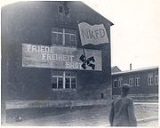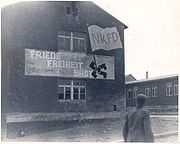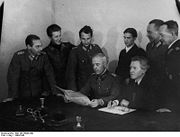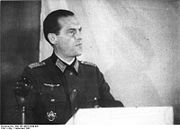
National Committee for a Free Germany
Encyclopedia
The National Committee for a Free Germany was a German
anti-Nazi
organization that operated in the Soviet Union
during World War II
.

 The rise of the Nazi Party to power in Germany
The rise of the Nazi Party to power in Germany
in 1933 led to the outlawing of the Communist Party of Germany
(KPD) and persecutions against its members, many of whom fled to the Soviet Union.
With the German invasion of the Soviet Union in Operation Barbarossa
, German prisoners of war began to fall into Soviet hands. Several attempts to establish an anti-Nazi organization from those POWs were made with little success since most of them still believed in the final victory of the Wehrmacht
.
With the German defeat at the Battle of Stalingrad
, the number of German POWs rose and their belief in a victorious Germany was damaged, hence they were more open to the idea of a membership in an anti-Nazi organization.
At the beginning of June, 1943, Alfred Kunella and Rudolf Herrnstadt started to write the manifesto of the Committee, in which historical Prussian figures who allied with Russians against Napoleon, are depicted as exemplary Germans, e.g. vom Stein, Arndt, Clausewitz and Yorck. The National Committee for a Free Germany (NKFD) was founded in Krasnogorsk
, near Moscow
on 12 July 1943; its president was the exiled German Communist writer Erich Weinert
with his deputies Lieutenant Heinrich Graf von Einsiedel
and Major Karl Hetz. Its leadership consisted of 38 members, including 28 Wehrmacht POWs and 10 exiled communists.
 After several failed attempts to recruit officers into the NKFD, it was suggested by Lieutenant-Colonel Alfred Brette that a special organization for officers be set up so that they would not have to come in contact with Communists and common soldiers.
After several failed attempts to recruit officers into the NKFD, it was suggested by Lieutenant-Colonel Alfred Brette that a special organization for officers be set up so that they would not have to come in contact with Communists and common soldiers.
Two months after the founding of the NKFD, the League of German Officers was founded; its leader was General Walther von Seydlitz-Kurzbach
. The main task of the BDO was to deliver propaganda
aimed at the German armed forces. A number of highly ranking officers joined the BDO, the most prominent of them being Field-Marshal Friedrich Paulus
, the commander of the Sixth Army captured at the Battle of Stalingrad
. The BDO later merged with the NKFD.
(Black - White - Red) were used instead of the Weimar German (Black - Red - Gold), as the Imperial colors were expected to be more popular among officers and soldiers of the conservative Heer. The stated goal of the NKFD organisation was a return to the pre-war borders of 1937, the opening of negotiations for peace, and the deposing and punishment of the Nazi leadership. It also called for the preservation of the power of the Wehrmacht. The NKFD believed that German civilians and soldiers had to place the interests of the German nation above those of their Nazi leaders.
As the war progressed and it became increasingly clear than an anti-Nazi putsch would not occur, the NKFD's ideological line became more leftist until it became identical to that of the KPD.
and the POWs in the Soviet camps. As an example of such activities Soviet Major Lev Kopelev
describes the joint psychological warfare
at Grudziądz
in March 1945 by Soviet Red Army
and members of the NKFD. General Walther von Seydlitz-Kurzbach offered to raise an anti-Hitler army from the NKFD and BDO members to fight against their own country, but the Soviets did not accept this offer.
Some NKFD members were attached to front line Soviets units to interrogate German POWs and spread propaganda to the Germans units that the Soviets were fighting against. Other NKFD members fought behind the German lines alongside Soviet partisan
units.
Towards the very end of the war so-called "Seydlitz-Troops" were sent to the German lines in uniform with orders to blend in with the defenders and spread confusion. Some rejoined their former comrades and others followed their orders. Many were caught and executed.
As the Red Army
entered Germany, some NKFD members were appointed as officials in the local government of the Soviet occupation zone replacing Nazi officials.
, NKFD members mostly returned to the Soviet occupation zone in Germany and had a key role in building the German Democratic Republic
. Some BDO members had a key role in building the National People's Army
, while others (like Seydlitz
), were imprisoned as POW again.
Germany
Germany , officially the Federal Republic of Germany , is a federal parliamentary republic in Europe. The country consists of 16 states while the capital and largest city is Berlin. Germany covers an area of 357,021 km2 and has a largely temperate seasonal climate...
anti-Nazi
Nazism
Nazism, the common short form name of National Socialism was the ideology and practice of the Nazi Party and of Nazi Germany...
organization that operated in the Soviet Union
Soviet Union
The Soviet Union , officially the Union of Soviet Socialist Republics , was a constitutionally socialist state that existed in Eurasia between 1922 and 1991....
during World War II
World War II
World War II, or the Second World War , was a global conflict lasting from 1939 to 1945, involving most of the world's nations—including all of the great powers—eventually forming two opposing military alliances: the Allies and the Axis...
.

History

Germany
Germany , officially the Federal Republic of Germany , is a federal parliamentary republic in Europe. The country consists of 16 states while the capital and largest city is Berlin. Germany covers an area of 357,021 km2 and has a largely temperate seasonal climate...
in 1933 led to the outlawing of the Communist Party of Germany
Communist Party of Germany
The Communist Party of Germany was a major political party in Germany between 1918 and 1933, and a minor party in West Germany in the postwar period until it was banned in 1956...
(KPD) and persecutions against its members, many of whom fled to the Soviet Union.
With the German invasion of the Soviet Union in Operation Barbarossa
Operation Barbarossa
Operation Barbarossa was the code name for Germany's invasion of the Soviet Union during World War II that began on 22 June 1941. Over 4.5 million troops of the Axis powers invaded the USSR along a front., the largest invasion in the history of warfare...
, German prisoners of war began to fall into Soviet hands. Several attempts to establish an anti-Nazi organization from those POWs were made with little success since most of them still believed in the final victory of the Wehrmacht
Wehrmacht
The Wehrmacht – from , to defend and , the might/power) were the unified armed forces of Nazi Germany from 1935 to 1945. It consisted of the Heer , the Kriegsmarine and the Luftwaffe .-Origin and use of the term:...
.
With the German defeat at the Battle of Stalingrad
Battle of Stalingrad
The Battle of Stalingrad was a major battle of World War II in which Nazi Germany and its allies fought the Soviet Union for control of the city of Stalingrad in southwestern Russia. The battle took place between 23 August 1942 and 2 February 1943...
, the number of German POWs rose and their belief in a victorious Germany was damaged, hence they were more open to the idea of a membership in an anti-Nazi organization.
At the beginning of June, 1943, Alfred Kunella and Rudolf Herrnstadt started to write the manifesto of the Committee, in which historical Prussian figures who allied with Russians against Napoleon, are depicted as exemplary Germans, e.g. vom Stein, Arndt, Clausewitz and Yorck. The National Committee for a Free Germany (NKFD) was founded in Krasnogorsk
Krasnogorsk, Moscow Oblast
Krasnogorsk is a city and the administrative center of Krasnogorsky District of Moscow Oblast, Russia, adjacent to the northwestern boundary of Moscow, on the Moskva River...
, near Moscow
Moscow
Moscow is the capital, the most populous city, and the most populous federal subject of Russia. The city is a major political, economic, cultural, scientific, religious, financial, educational, and transportation centre of Russia and the continent...
on 12 July 1943; its president was the exiled German Communist writer Erich Weinert
Erich Weinert
Erich Bernhard Gustav Weinert was a German Communist writer and a member of the Communist Party of Germany .-Biography:...
with his deputies Lieutenant Heinrich Graf von Einsiedel
Heinrich Graf von Einsiedel
Heinrich Graf von Einsiedel was a German journalist and politician.- Biography :Einsiedel, a great-grandson of Otto von Bismarck, was born in Potsdam, Province of Brandenburg, as the youngest child to Herbert von Einsiedel and Irene von Bismarck-Schönhausen...
and Major Karl Hetz. Its leadership consisted of 38 members, including 28 Wehrmacht POWs and 10 exiled communists.
League of German Officers

Two months after the founding of the NKFD, the League of German Officers was founded; its leader was General Walther von Seydlitz-Kurzbach
Walther von Seydlitz-Kurzbach
Walther Kurt von Seydlitz-Kurzbach was a German general. He was born in Hamburg, Germany, into the noble Prussian Seydlitz family. He was also a recipient of the Knight's Cross of the Iron Cross with Oak Leaves...
. The main task of the BDO was to deliver propaganda
Propaganda
Propaganda is a form of communication that is aimed at influencing the attitude of a community toward some cause or position so as to benefit oneself or one's group....
aimed at the German armed forces. A number of highly ranking officers joined the BDO, the most prominent of them being Field-Marshal Friedrich Paulus
Friedrich Paulus
Friedrich Wilhelm Ernst Paulus was an officer in the German military from 1910 to 1945. He attained the rank of Generalfeldmarschall during World War II, and is best known for having commanded the Sixth Army's assault on Stalingrad during Operation Blue in 1942...
, the commander of the Sixth Army captured at the Battle of Stalingrad
Battle of Stalingrad
The Battle of Stalingrad was a major battle of World War II in which Nazi Germany and its allies fought the Soviet Union for control of the city of Stalingrad in southwestern Russia. The battle took place between 23 August 1942 and 2 February 1943...
. The BDO later merged with the NKFD.
Ideology
Although the NKFD operated in the Soviet Union and consisted partly of communists, it used conservative symbols and ideology. For example, the old flag colors of Imperial GermanyGerman Empire
The German Empire refers to Germany during the "Second Reich" period from the unification of Germany and proclamation of Wilhelm I as German Emperor on 18 January 1871, to 1918, when it became a federal republic after defeat in World War I and the abdication of the Emperor, Wilhelm II.The German...
(Black - White - Red) were used instead of the Weimar German (Black - Red - Gold), as the Imperial colors were expected to be more popular among officers and soldiers of the conservative Heer. The stated goal of the NKFD organisation was a return to the pre-war borders of 1937, the opening of negotiations for peace, and the deposing and punishment of the Nazi leadership. It also called for the preservation of the power of the Wehrmacht. The NKFD believed that German civilians and soldiers had to place the interests of the German nation above those of their Nazi leaders.
As the war progressed and it became increasingly clear than an anti-Nazi putsch would not occur, the NKFD's ideological line became more leftist until it became identical to that of the KPD.
Activity
The NKFD and BDO activity focused on propaganda. They had their own newspaper and radio station. They sent leaflets to the German soldiers at the frontEastern Front (World War II)
The Eastern Front of World War II was a theatre of World War II between the European Axis powers and co-belligerent Finland against the Soviet Union, Poland, and some other Allies which encompassed Northern, Southern and Eastern Europe from 22 June 1941 to 9 May 1945...
and the POWs in the Soviet camps. As an example of such activities Soviet Major Lev Kopelev
Lev Kopelev
Lev Zalmanovich Kopelev was a Soviet author and a dissident.- Biography :...
describes the joint psychological warfare
Psychological warfare
Psychological warfare , or the basic aspects of modern psychological operations , have been known by many other names or terms, including Psy Ops, Political Warfare, “Hearts and Minds,” and Propaganda...
at Grudziądz
Grudziadz
Grudziądz is a city in northern Poland on the Vistula River, with 96 042 inhabitants . Situated in the Kuyavian-Pomeranian Voivodeship , the city was previously in the Toruń Voivodeship .- History :-Early history:...
in March 1945 by Soviet Red Army
Red Army
The Workers' and Peasants' Red Army started out as the Soviet Union's revolutionary communist combat groups during the Russian Civil War of 1918-1922. It grew into the national army of the Soviet Union. By the 1930s the Red Army was among the largest armies in history.The "Red Army" name refers to...
and members of the NKFD. General Walther von Seydlitz-Kurzbach offered to raise an anti-Hitler army from the NKFD and BDO members to fight against their own country, but the Soviets did not accept this offer.
Some NKFD members were attached to front line Soviets units to interrogate German POWs and spread propaganda to the Germans units that the Soviets were fighting against. Other NKFD members fought behind the German lines alongside Soviet partisan
Soviet partisans
The Soviet partisans were members of a resistance movement which fought a guerrilla war against the Axis occupation of the Soviet Union during World War II....
units.
Towards the very end of the war so-called "Seydlitz-Troops" were sent to the German lines in uniform with orders to blend in with the defenders and spread confusion. Some rejoined their former comrades and others followed their orders. Many were caught and executed.
As the Red Army
Red Army
The Workers' and Peasants' Red Army started out as the Soviet Union's revolutionary communist combat groups during the Russian Civil War of 1918-1922. It grew into the national army of the Soviet Union. By the 1930s the Red Army was among the largest armies in history.The "Red Army" name refers to...
entered Germany, some NKFD members were appointed as officials in the local government of the Soviet occupation zone replacing Nazi officials.
Publications
Freies Deutschland was the weekly newspaper of the NKFD, published from 1943 to 1945.Post-War
After the defeat of Nazi GermanyNazi Germany
Nazi Germany , also known as the Third Reich , but officially called German Reich from 1933 to 1943 and Greater German Reich from 26 June 1943 onward, is the name commonly used to refer to the state of Germany from 1933 to 1945, when it was a totalitarian dictatorship ruled by...
, NKFD members mostly returned to the Soviet occupation zone in Germany and had a key role in building the German Democratic Republic
German Democratic Republic
The German Democratic Republic , informally called East Germany by West Germany and other countries, was a socialist state established in 1949 in the Soviet zone of occupied Germany, including East Berlin of the Allied-occupied capital city...
. Some BDO members had a key role in building the National People's Army
National People's Army
The National People’s Army were the armed forces of the German Democratic Republic .The NVA was established in 1956 and disestablished in 1990. There were frequent reports of East German advisors with Communist African countries during the Cold War...
, while others (like Seydlitz
Walther von Seydlitz-Kurzbach
Walther Kurt von Seydlitz-Kurzbach was a German general. He was born in Hamburg, Germany, into the noble Prussian Seydlitz family. He was also a recipient of the Knight's Cross of the Iron Cross with Oak Leaves...
), were imprisoned as POW again.
Notable members
- Anton AckermannAnton AckermannAnton Ackermann was an East German politician. In 1953, he briefly served as Minister of Foreign Affairs....
- Wilhelm AdamWilhelm Adam (Politician)Wilhelm Adam was a career military officer who served in three German Armies and later became an East German politician .-Life:Adam's father was a farmer...
- Johannes R. BecherJohannes R. BecherJohannes Robert Becher was a German politician, novelist, and poet.-Early life:Johannes R. Becher was the son of Judge Heinrich Becher. In 1910 he tried to commit suicide with a friend; only Becher survived. From 1911 he studied medicine and philosophy in Munich and Jena...
- Willi BredelWilli BredelWilli Bredel was a German writer and president of the Akademie der Künste. Born in Hamburg, he was a pioneer of socialist realist literature....
- Heinrich Graf von EinsiedelHeinrich Graf von EinsiedelHeinrich Graf von Einsiedel was a German journalist and politician.- Biography :Einsiedel, a great-grandson of Otto von Bismarck, was born in Potsdam, Province of Brandenburg, as the youngest child to Herbert von Einsiedel and Irene von Bismarck-Schönhausen...
- Peter GingoldPeter GingoldPeter Gingold was a figure in the German Resistance and the National Committee for a Free Germany. He was born in a Jewish family in Aschaffenburg, Bavaria. He was a member of the Communist Party of Germany and its successor the German Communist Party...
- Alfred KurellaAlfred KurellaAlfred Kurella was a German author and functionary of the Socialist Unity Party of Germany in East Germany.Kurella was born in Brzeg, Silesia...
- Arno von LenskiArno von LenskiArno Ernst Max von Lenski was a German military officer and general who served in the Imperial German army, the Wehrmacht, and after the war in the National People's Army of the German Democratic Republic, where he was also a politician.-Early career:Lenski was born in the East Prussian village of...
- Wolfgang LeonhardWolfgang LeonhardWolfgang Leonhard is a German political author, historian, and expert on Communism. He is the only living member of the Ulbricht Group.-Early years:...
- Vincenz MüllerVincenz MüllerVincenz Müller was a German military officer and general who served in the Imperial German army, the Wehrmacht Heer, and after the war in the National People's Army of the German Democratic Republic, where he was also a politician.-Early career:Müller was born in the Kingdom of Bavaria into a...
- Friedrich PaulusFriedrich PaulusFriedrich Wilhelm Ernst Paulus was an officer in the German military from 1910 to 1945. He attained the rank of Generalfeldmarschall during World War II, and is best known for having commanded the Sixth Army's assault on Stalingrad during Operation Blue in 1942...
- Wilhelm PieckWilhelm PieckFriedrich Wilhelm Reinhold Pieck was a German politician and a Communist. In 1949, he became the first President of the German Democratic Republic, an office abolished upon his death. He was succeeded by Walter Ulbricht, who served as Chairman of the Council of States.-Biography:Pieck was born to...
- Walther von Seydlitz-KurzbachWalther von Seydlitz-KurzbachWalther Kurt von Seydlitz-Kurzbach was a German general. He was born in Hamburg, Germany, into the noble Prussian Seydlitz family. He was also a recipient of the Knight's Cross of the Iron Cross with Oak Leaves...
- Walter UlbrichtWalter UlbrichtWalter Ulbricht was a German communist politician. As First Secretary of the Socialist Unity Party from 1950 to 1971 , he played a leading role in the creation of the Weimar-era Communist Party of Germany and later in the early development and...
- Gustav von WangenheimGustav von WangenheimGustav von Wangenheim was a German actor, screenwriter and director.- Life :Wangenheim was born Ingo Clemens Gustav Adolf Freiherr von Wangenheim in Wiesbaden, Hesse, to parents Eduard Clemens Freiherr von Wangenheim and Minna Mengers...
- Erich WeinertErich WeinertErich Bernhard Gustav Weinert was a German Communist writer and a member of the Communist Party of Germany .-Biography:...
- Otto WinzerOtto WinzerOtto Winzer was an East German diplomat. He returned from exile in the Soviet Union as part of the Ulbricht Group, charged with setting up the Soviet Military Administration in Germany after World War II. He served as the foreign minister of East Germany between 1965 and 1975.- References :...
- Friedrich Wolf
- Markus WolfMarkus WolfMarkus Johannes "Mischa" Wolf was head of the General Intelligence Administration , the foreign intelligence division of East Germany's Ministry for State Security . He was the MfS's number two for 34 years, which spanned most of the Cold War...

